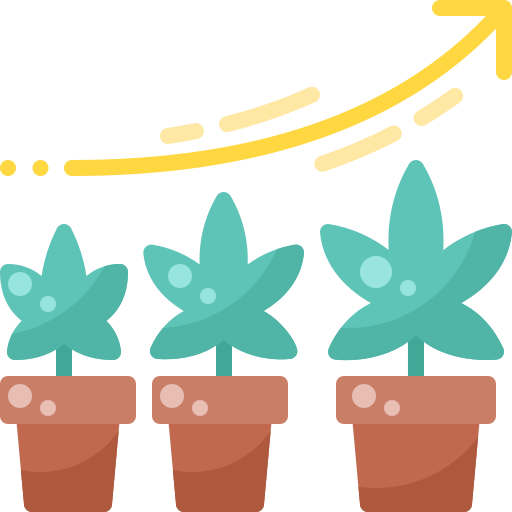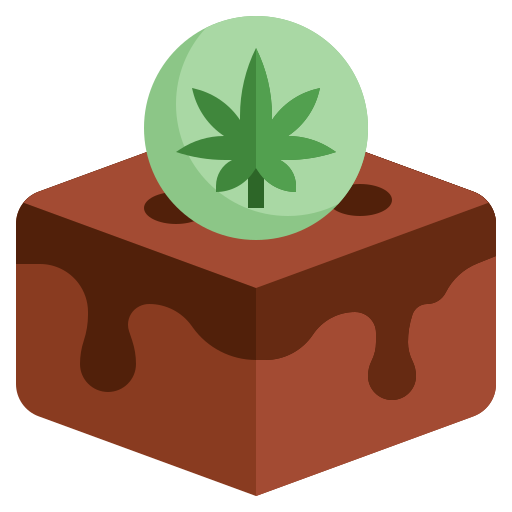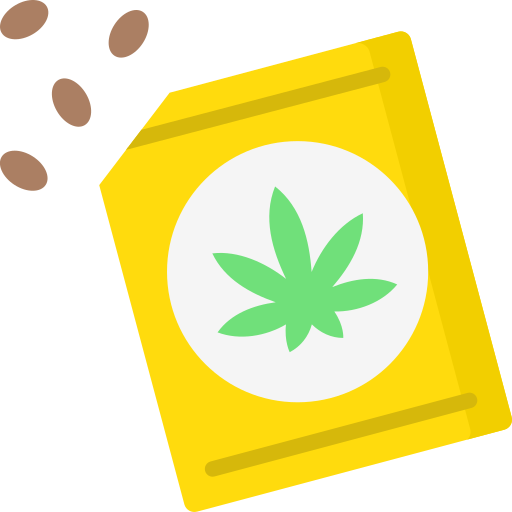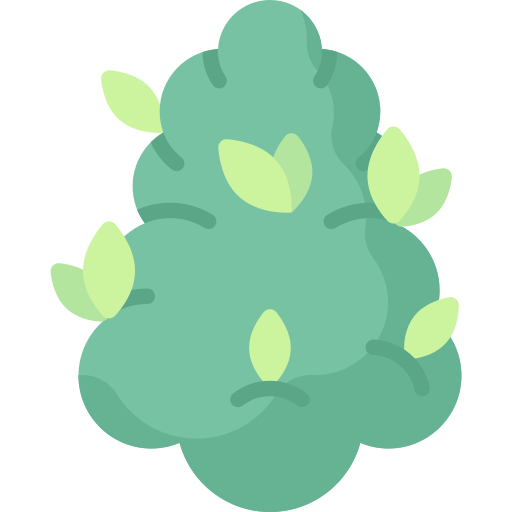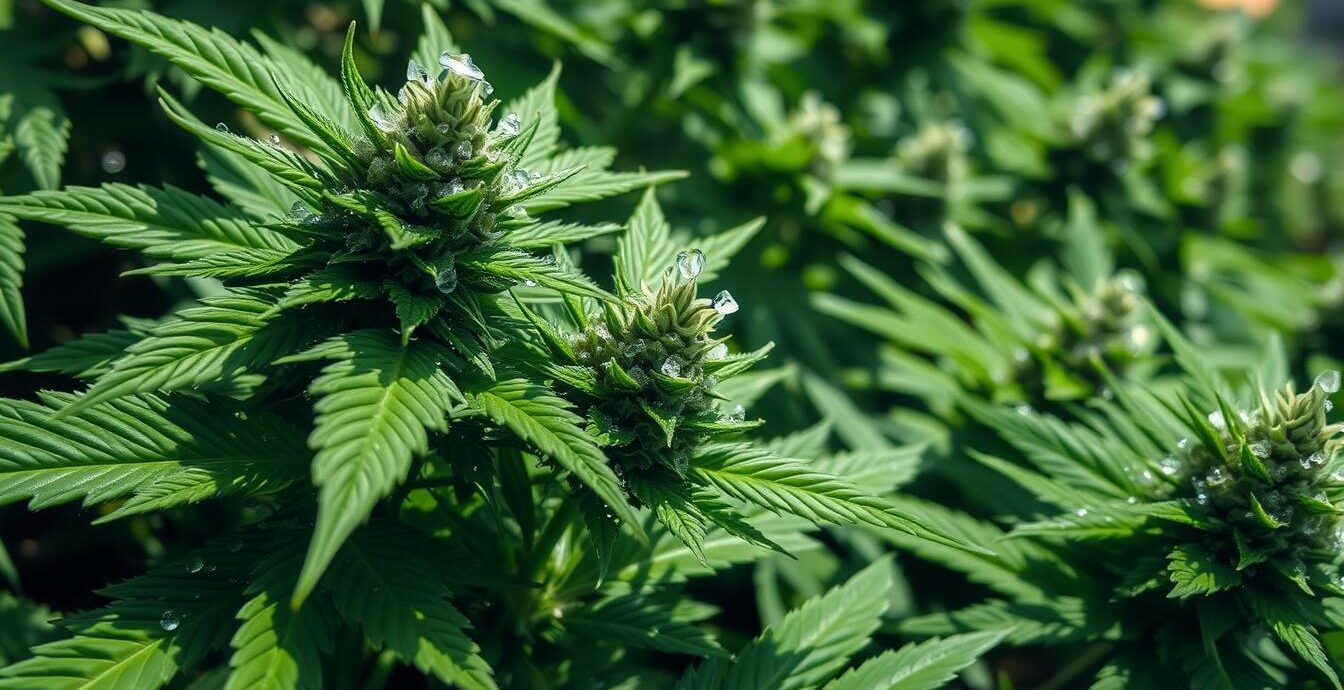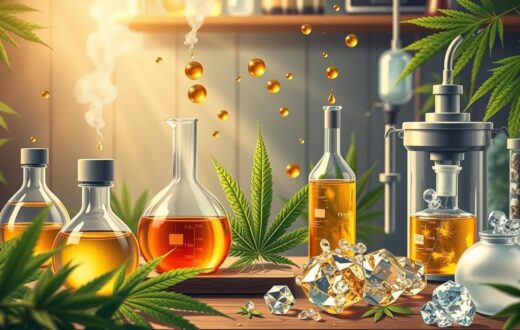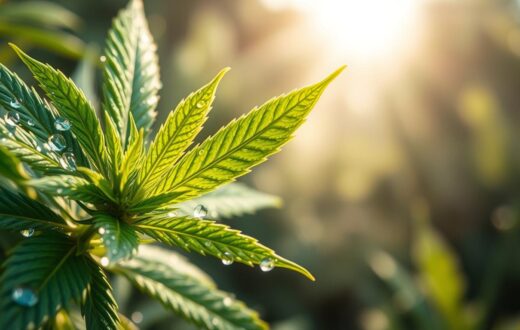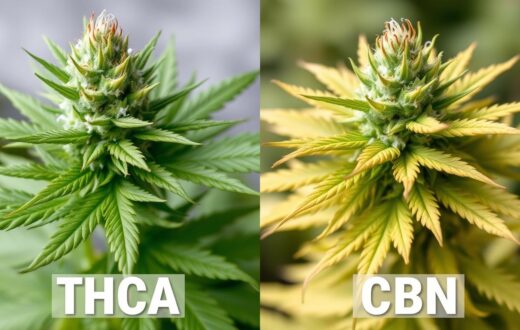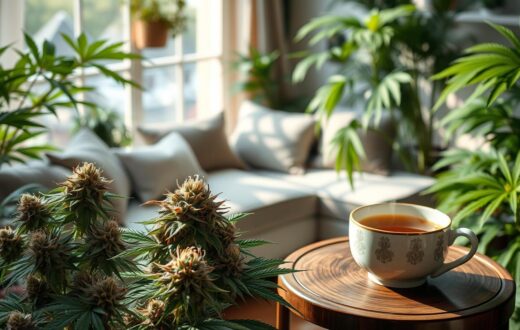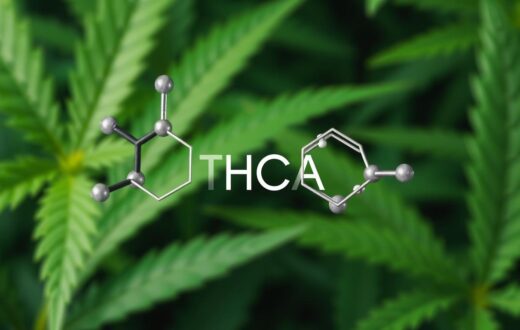Ever wondered why raw cannabis won’t get you high? The secret lies in a compound called THCA. This non-psychoactive cannabinoid found in cannabis plants is sparking curiosity among both medical and recreational users. But what exactly is THCA, and why should beginners pay attention?
Tetrahydrocannabinolic acid, or THCA, is the precursor to THC, the famous compound responsible for marijuana’s intoxicating effects. Unlike its well-known cousin, THCA doesn’t produce a high when consumed raw. Yet, it’s gaining popularity for its potential therapeutic benefits.
For beginners exploring the world of cannabinoids, understanding THCA is crucial. It’s present in higher levels in fresh cannabis compared to dried plants. When heated, THCA transforms into THC, becoming more potent and psychoactive. This process, known as decarboxylation, happens when you smoke or vaporize cannabis.
Curious about trying THCA? Products like Dante’s Inferno THCa flower are available for $17 per gram. But remember, effects can vary based on the strain and your individual tolerance. As we dive deeper into the world of THCA, we’ll explore its chemistry, potential benefits, and what beginners need to know to navigate this exciting cannabinoid safely and effectively.
What is THCA?
THCA stands for tetrahydrocannabinolic acid. It’s a compound found in raw cannabis plants. There are over 500 compounds in cannabis, but THCA is unique. It doesn’t make you feel high like THC does.
Definition of THCA
THCA is the first step to making THC, the part of cannabis that gets you high. It’s found in fresh cannabis and might have health benefits. These could include reducing inflammation, protecting the brain, and helping with nausea.
Studies are still new, but they show promise. THCA might help with arthritis, bowel disease, and brain diseases.
Differences Between THCA and THC
THCA and THC are different, even though they look similar. THCA doesn’t make you feel high. THC, however, does.
When cannabis is heated or exposed to light, THCA turns into THC. This is why smoking or vaping cannabis gets you high. But eating raw cannabis doesn’t.
The Science Behind THCA
THCA is a compound found in cannabis plants. It’s the precursor to THC, which gives the plant its euphoric effects. Unlike THC, THCA doesn’t make you high in its raw form. This is because of how it’s produced and how it interacts with our bodies.
How THCA is Produced
Cannabis plants naturally make THCA as they grow. The process starts in the plant’s trichomes – tiny, crystal-like structures on buds and leaves. These trichomes are like factories, making THCA and other cannabinoids.
Growers can increase THCA levels by choosing the right strain, using organic methods, and harvesting at the right time.
The Role of Cannabinoids in the Body
Our bodies have an endocannabinoid system that interacts with compounds like THCA. While THCA itself isn’t psychoactive, it can turn into THC when heated. This happens during smoking or cooking.
This transformation changes how the compound affects our body. It leads to the well-known “high” from cannabis use.
THCA might offer benefits without the intoxicating effects of THC. Some studies suggest it could help with inflammation, nausea, and metabolism. As interest grows, more research is being done to understand THCA’s full potential. Always talk to a healthcare professional before trying new cannabis products.
Potential Benefits of THCA
THCA, the non-psychoactive precursor to THC, is getting a lot of attention. It’s found in raw cannabis and offers a way to use the plant’s benefits without getting high.
Therapeutic Uses of THCA
Research shows THCA might have strong anti-inflammatory effects. It could protect nerves and help with nausea. Some studies suggest it might slow down cancer cell growth. These findings make THCA a promising area for medical research.
Anecdotal Reports and Research Insights
People say THCA helps with inflammation and nausea without making them feel high. The way THCA is extracted keeps its benefits. Raw cannabis juice, with 10-20 mg of THCA, is a favorite among users.
But, we need more research on THCA. It’s still in the early stages. Always talk to a doctor before using THCA for health reasons. As interest grows, we’ll see more research on this interesting compound.
How THCA Differs From Other Cannabinoids
Cannabis plants have over 100 cannabinoids, each with its own special traits. THCA is unique, especially when compared to CBD and Delta-9 THC. Let’s dive into how THCA is different from these well-known cannabinoids.
Comparison with CBD
THCA and CBD are both non-psychoactive cannabinoids found in cannabis plants. CBD is known for its health benefits, while THCA is THC’s precursor. THCA may offer relaxation without the high and has shown promise in reducing nausea in rat studies.
Comparison with Delta-9 THC
The thca vs thc comparison shows some key differences. THCA is non-psychoactive and doesn’t interact with cannabinoid receptors like THC does. When heated, THCA turns into Delta-9 THC, the main psychoactive compound in cannabis.
THC binds strongly to cannabinoid receptors, causing euphoria and relaxation. THCA, in its raw form, may offer therapeutic benefits without the high of THC. Research suggests THCA might have stronger anti-inflammatory and neuroprotective properties than THC.
THCA products from hemp are federally legal and easy to find, unlike THC products. This makes it simpler for people to try THCA’s potential benefits. Whether you’re interested in THCA flower, vape products, or other forms, knowing these differences helps you make better choices about cannabis use.
Legal Status of THCA in the United States
The laws about THCA in the United States are complex and change from state to state. The 2018 Farm Bill made it legal to grow hemp, which includes THCA products. Most states allow hemp-derived THCA with less than 0.3% THC, but some have exceptions.
Federal Regulations
Federal law says hemp-derived THCA is okay if it has less than 0.3% THC. This has led to more THCA products in the market. You can now find a variety of THCA items, like oils, flowers, and edibles.
State-specific Laws
Even though federal law sets a standard, state laws can be different. Right now, 43 states allow THCA from hemp. But, Arkansas, Minnesota, Oregon, Rhode Island, Idaho, New Hampshire, and South Dakota have rules.
Some states have made their hemp product rules stricter because of Farm Bill doubts. It’s important for businesses and users to know their state’s laws about THCA.
In states where both medical and recreational marijuana are legal, there might be extra rules about THCA. The types of THCA products you can find vary a lot. Some states offer a wide range, while others have fewer options. Always check local laws before buying or using THCA products to make sure you’re following the rules.
THCA Consumption Methods
THCA offers many ways to enjoy it. You can use raw plant material or concentrated extracts. Let’s look at the most popular methods and what makes them special.
Raw Cannabis vs. Extracts
Raw cannabis keeps THCA in its natural form. Juicing fresh leaves or flowers lets you enjoy THCA without getting high. Extracts like diamonds, bubble hash, and live rosin are very potent. They have over 99.9% THCA for a strong experience.
Cooking with THCA
Making thca edibles is a favorite way to use it. But, remember that heating THCA turns it into THC, which can get you high. To avoid this, add raw THCA to uncooked dishes or smoothies. Tinctures and oils make it easy to add to your cooking.
Dabbing is a top choice for THCA concentrates. Portable vaporizers are great for on-the-go use. You can also add THCA concentrate to traditional cannabis flowers for a better smoke. Nectar collectors and electric dab rigs are easy to use and don’t need a lot of equipment.
Effects of THCA
THCA is a key compound in cannabis that offers unique benefits without the high. Unlike THC, THCA doesn’t cause intoxication in its raw form. This difference between thca vs thc is crucial for users seeking therapeutic effects without psychoactive impacts.
Psychoactive Properties
THCA itself doesn’t produce a “high.” It’s non-psychoactive until heated. When smoked, vaped, or cooked, THCA turns into THC. This process, called decarboxylation, creates the euphoric effects cannabis is known for.
Users should know that THCA products can become psychoactive if not stored properly.
Non-psychoactive Benefits
The thca benefits are gaining attention in the wellness world. Research suggests it may help with inflammation, nausea, and seizures. Some users report mood improvements and physical comfort without feeling “stoned.”
THCA might also support appetite and offer neuroprotective effects. These potential advantages make THCA an exciting option for those seeking natural remedies.
When trying THCA, start with small amounts. Pay attention to how your body reacts. Keep a journal to track changes over time. Remember, effects may take longer to appear compared to THC products.
As research continues, we’re learning more about THCA’s role in health and wellness.
How to Find Quality THCA Products
Finding the best THCA products can be hard. We’ll show you how to spot the top ones. Look for THCA rich strains with strong smells, bright colors, and lots of frosty trichomes. These signs mean the cannabis is potent and well-grown.
Lab Testing and Certifications
Lab reports are key to checking the quality and content of cannabinoids. Good sellers share info on where the cannabis comes from, how it’s grown, and third-party tests. Also, make sure the THCA flower has less than 0.3% THC to follow the 2018 Farm Bill. Look for products with clear lab results showing the THCA levels.
Understanding Labels and Ingredients
Reading labels is important for making smart choices. Check the THCA content, which varies among strains. For example, Arete’s White Widow has 33.9% THCA, while Apollo’s Ice Cream Cookies has 19-21%. Other top strains include Lucky Elk’s Cereal Milk at 24% and The Green Dragon CBD’s Gary Payton at 28.7%. Prices range from $34.99 to $40.00.
When looking at THCA extraction methods, full-spectrum is a good choice. It keeps the plant’s natural terpenes and cannabinoids, which might boost benefits. Keep your THCA flower in a cool, dark spot in an airtight container to keep it potent and flavorful. Now you’re set to find high-quality THCA products that fit your needs.
Dosage Considerations for Beginners
For those new to THCA, knowing the right dose is important. THCA benefits can differ for everyone. So, it’s smart to think carefully about how much to take.
Start Low and Go Slow
Beginners should start with 2 to 5 mg of THCA. This small amount helps you see how your body reacts. Remember, THCA doesn’t get you high unless it’s heated. Still, it’s good to watch how much you take.
Individual Responses to THCA
How you react to THCA can depend on several things. These include your weight, how fast you metabolize, and if you’ve used cannabis before. Some might feel effects from 5 mg, while others might need more. Listen to your body and adjust your dose as needed.
Think about how you’re taking THCA. Raw cannabis or juicing keeps THCA non-psychoactive. Tinctures and oils give a steady dose, usually working in 30 minutes. Always keep your THCA flower in a cool, dark spot. This helps keep its strength and lets you enjoy its benefits.
Potential Side Effects of THCA
Starting with THCA can be thrilling, but knowing the side effects is key. While it offers many benefits, some people might feel mild reactions. Let’s look at what you might face and when to get professional help.
Common Mild Reactions
Most side effects from THCA are mild. Some users feel sleepy or notice changes in their appetite. Dry mouth is also common. Rarely, you might feel dizzy or a bit nauseous.
When to Consult a Professional
Starting with small doses of THCA is a good idea. Watch how your body reacts. If you have ongoing or worrying symptoms, talk to a healthcare provider.
This is especially important if you have health issues or take other medicines. Regular doctor visits can help you use THCA safely and get the most benefits.
Remember, everyone reacts differently to cannabinoids. What works for one person might not work for another. Paying attention to your body’s signals helps you use THCA safely and effectively.
Navigating THCA in the Marketplace
The THCA market has a wide range of products. You can find everything from THCA rich strains to THCA edibles. With so many options, knowing where to buy and what to look for is key.
Where to Buy THCA Products
THCA products are easy to find online and can be shipped to all 50 states. This is because THCA is seen as hemp under federal law. Most online stores quickly process orders, making it easy for buyers.
Even though Texas hasn’t banned THCA sales, it’s wise to check local laws before buying.
Understanding Product Variety
The market has a variety of THCA products. Some strains have over 25% THCA content. THCA edibles are also available for those who don’t like smoking.
When shopping, look for lab reports and certifications. These ensure the product’s quality and meets legal THC limits. Reading customer reviews can also help you choose the right product.
The THCA market is still growing, offering chances for both buyers and sellers. When exploring THCA products, focus on quality, legality, and your needs. This way, you can make smart choices.
THCA and the Entourage Effect
The world of cannabis plants is complex and fascinating. When we talk about THCA extraction, we’re just scratching the surface of what these plants can offer. The entourage effect is a key concept that helps us understand why cannabis is more than just a sum of its parts.
What is the Entourage Effect?
The entourage effect refers to how different compounds in cannabis plants work together. It’s like a team where each player has a unique role. When combined, they create something greater than what each could do alone. This effect involves cannabinoids like THCA and THC, as well as terpenes, which give cannabis its distinct smell and taste.
Importance of Full-Spectrum Products
Full-spectrum products contain a wide range of compounds found in cannabis plants. These products aim to keep the natural balance of elements intact. Research suggests that full-spectrum extracts might be more effective than isolated compounds. For example, a study found that a whole cannabis extract was better at treating breast cancer cells than pure THC alone.
When choosing THCA products, consider going for full-spectrum options. They might offer more benefits due to the entourage effect. But remember, everyone’s body reacts differently to cannabis. What works for one person might not work the same for another. It’s always best to start with small amounts and see how your body responds.
Future of THCA Research
Research on THCA is growing fast. Scientists are finding new ways it helps us. We’re learning more about this special part of raw cannabis. The future is bright for THCA, with more studies on its health benefits.
Ongoing Studies
Right now, scientists are looking into THCA’s effects. They want to know how it fights inflammation and protects the brain. They’re also studying its role in pain relief and anxiety reduction. These studies help us understand THCA’s full potential.
Potential Developments
New ways to extract THCA are on the horizon. These improvements could make THCA products more effective. We might see targeted treatments for different health issues. There’s also a chance we’ll learn more about how THCA works with our bodies.
The cannabis world is changing, and THCA is leading the way. Every new finding opens up more uses for this compound. As research goes on, we’ll see new THCA products. The future of THCA research is full of promise for our health and wellness.
Community Perspectives on THCA
Exploring THCA for beginners is exciting. Many users share their experiences with THCA benefits. This gives insights to those new to this compound. Let’s look at what people say about THCA and hear from experts.
User Testimonials
Users of THCA report many positive effects. Some find relief from pain and inflammation without feeling high. Others say it improves their mood and sleep.
One user mentioned, “THCA helps me relax without clouding my mind.” These stories show THCA’s potential for natural wellness.
Industry Expert Opinions
Experts in cannabis are cautiously optimistic about THCA. Dr. Smith, a cannabis researcher, says, “THCA shows promise, but we need more studies.” They see THCA as a non-intoxicating alternative to THC.
They stress the importance of quality products and proper use. As research grows, we’ll learn more about THCA benefits and its role in wellness.
Remember, everyone’s body reacts differently to THCA. It’s wise to start slow and pay attention to how you feel. As the THCA market expands, we expect to see more diverse experiences and expert insights.
Conclusion: Key Takeaways on THCA
As we finish our look at THCA for beginners, it’s clear that this cannabinoid is unique. THCA is found in fresh cannabis and turns into THC when heated or aged. Unlike THC, THCA doesn’t make you high, making it interesting for those looking for benefits without the psychoactive effects.
Summary of Benefits and Considerations
Research on THCA is ongoing, but early findings are promising. It might have anti-inflammatory effects by blocking certain enzymes. Unlike THC, THCA’s effects on the body are still being studied. More research is needed to fully grasp its potential benefits.
Encouragement to Explore Responsibly
If you’re new to THCA, be cautious and responsible. THCA can be legally bought as raw cannabis extract or hemp flower in many places. Start with small amounts and watch how your body reacts. Always talk to a doctor before adding THCA to your routine. As laws change, stay updated on local regulations. Exploring THCA can be a fascinating journey into the world of cannabinoids.
